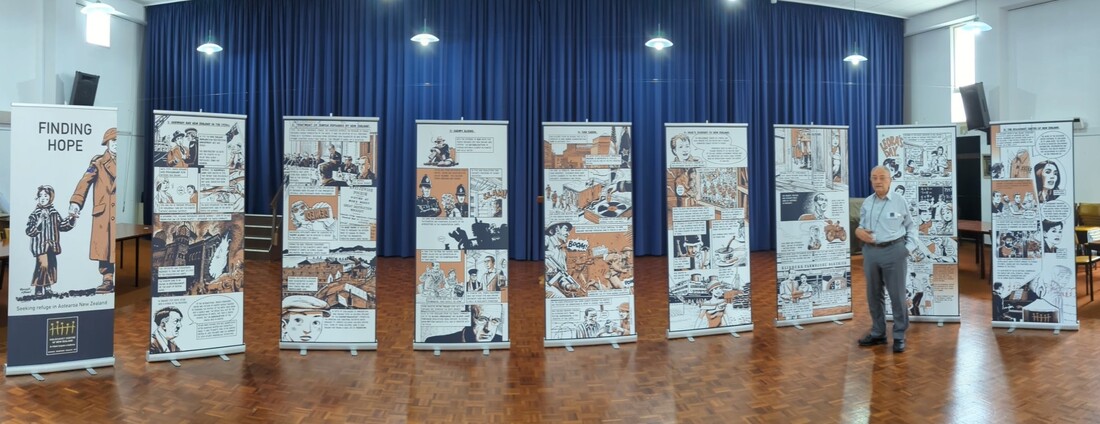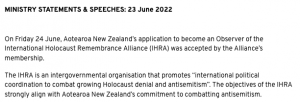New Zealand and the IHRA definition – some pertinent questions

JVL Introduction
New Zealand’s Ministry of Foreign Affairs and Trade has become an observer at the IHRA.
Here Marilyn Garson of Alternative Jewish Voices points out that defining racism is not the prerogative of that Ministry but must involve the Commissioners for Human Rights and Race Relations – and the public.
Furthermore, the IHRA as an organisation has two incompatible activities: valuable Holocaust education; and the political application of the IHRA’s working definition of antisemitism to shield Israel from criticism for its human rights abuses.
“We do not need a new definition of antisemitism,” she says “in order to combat racism and preserve our rights to vigorous protest speech. We need action. We need to form a common front against racism in all of its forms…”
This article was originally published by Sh'ma Koleinu – Alternative Jewish Voices (NZ) on Sun 3 Jul 2022. Read the original here.
The NZ Ministry of Foreign Affairs and Trade (MFAT) has taken up observer status in the IHRA

New Zealand, Ministry of Foreign Affairs and Trade Website
On June 24, the NZ Ministry of Foreign Affairs and Trade (MFAT) took up observer status in the International Holocaust Remembrance Alliance (IHRA). On July 1, MFAT acknowledged it had overstepped by advising city councils not to allow Palestinians to display their national colours on Nakba Day, because it might offend Israel’s ambassador and supporters. Sharply differing definitions of antisemitism underlie both of these developments. Given MFAT’s pro-Israel orientation, we’d like some public assurance about its intentions.
Brian Klug, a member of Oxford University’s philosophy faculty, recently drew a helpful distinction. Antisemitism is inherently political: it is an appropriate object of public policy. Of late it has also been politicised as a vehicle to defend Zionism.
Antisemitism cannot be reduced to present-day arguments about anti-Zionism (and it is racist per se to reduce pluralist Judaism to Zionism). A wise, historically informed definition of antisemitism will be written by scholars, historians, practitioners and policy experts with public input.
To make sense of current developments, we need to understand and distinguish between the phenomenon of antisemitism and its political use.
—
MFAT has nominally joined an international organisation to promote understanding of the Holocaust and combat antisemitism. We agree that Holocaust education is a public good.
However, the malicious distortion or denial of the Holocaust differs from a general ignorance of history. Holocaust distortion or denial is an intentional, racist tactic which primarily serves White supremacist or far Right purposes. The real antisemitic threat in Aotearoa comes from the White and the Right. We question whether the IHRA organisation is fit for the second part of its mission.
The IHRA organisation is prominently known for the IHRA Working Definition of Antisemitism (IHRA-WD). ‘The IHRA definition is one of the most contentious documents in the history of efforts to combat antisemitism… With its intensive focus on the critique of Israel as a marker of antisemitism, the IHRA definition has been heavily implicated in the suppression of Israel-critical speech in recent years.’
The IHRA-WD is a political project of Zionism. It was not designed in response to ̶ and it does not respond to ̶ Jewish experience of far Right or White antisemitism. Nor does it respond to Holocaust ignorance. It separates antisemitism from the wider shared work of antiracism, and it shields Israel from criticism by rendering anti-Zionist protest antisemitic. The IHRA-WD would consider most assertions of Palestinian identity and equal rights antisemitic.
The Israel-centric IHRA-WD is the wrong tool for the task of combating antisemitism in Aotearoa. Its use also creates harmful confusion about the meaning and prevalence of antisemitism. We recently wrote about the IHRA definition here, and we cite expert opposition to its use on our resource page.
—
The IHRA organisation houses two incompatible activities: Holocaust commemoration and the political application of the IHRA-WD to shield Israel from criticism for its human rights abuses. The IHRA’s political project takes cynical advantage of the moral authority of the organisation’s name.
We see the same intentional confusion here in Aotearoa. The Holocaust and Antisemitism Foundation sounds like an admirable Jewish community undertaking. It is in fact a majority Evangelical Christian organisation whose directors overlap with the Israel Institute (a majority of whose directors are, again, not Jewish). The directors of both organisations overlap with leaders of the neoliberal Free Speech Union, Taxpayers’ Union and Auckland Property Investors’ Association. The names of these entities should not trick anyone into thinking that they represent or act in the interests of the NZ Jewish community. They promote Israel rather than the welfare of the Jewish community of Aotearoa. As with the IHRA, the Zionist project of the Holocaust and Antisemitism Foundation benefits from the moral authority of the organisation’s name.
Israeli ambassador, Excellency Ron Yaakoby, was previously the Director for Combating Antisemitism and Holocaust Remembrance in Israel’s Ministry of Foreign Affairs. On Holocaust Remembrance Day 2021, he thanked the countries that had already adopted the IHRA-WD, called on New Zealand to do the same and added, ‘Such an effort can be followed by New Zealand joining the IHRA.’
All this lobbying seeks to politicise antisemitism in New Zealand. We need to restore its public policy focus. Antisemitism is an integral part of the bundle of racist hatreds and resentments that are encroaching on our public discourse – encroaching from the Right. New Zealand’s Jewish community is among their targets.
—
What now?
The IHRA organisation’s website seems to suggest that its three stages of membership take 4 – 5 years to complete. Membership criteria do not explicitly list the IHRA-WD, but full member states must ‘endorse the previous decisions of the IHRA.’ That sounds like the creaking of a back door.
Defining racism in Aotearoa is not MFAT’s task because it is not a foreign affair. We would like to hear public assurance that the policy discussion of racism (which has begun in the area of hatespeech) will involve the Commissioners for Human Rights and Race Relations – and the public.
There is important work to do in the meantime.
Although the IHRA-WD has no standing in this country, we have just witnessed its effect. The NZ Jewish Council used it in their 2021 survey of antisemitism, classifying beliefs consistent with the world’s leading human rights organisations as antisemitic. The IHRA-WD shaped the conclusion that 2/3 of New Zealanders hold some antisemitic attitudes. The survey was a political act, far removed from the real threats to the security of New Zealand’s Jewish community.
If we do not call out each use of this politicised definition, proponents of the IHRA-WD will introduce it by stealth.
When anti-Zionism is called antisemitism, we should call attention to the IHRA-WD definition in order to preserve our rights to political speech. Conversely we must not shield the real antisemitism that lurks behind some anti-Zionist protest, in order to combat the racism that targets the Jewish community. Those are two sides of the same coin.
We have had one close call to remind us that public officials also need awareness. In 2020, the Wellington City Council was asked to make a harmless gesture to the Jewish community by adopting a little statement called the IHRA-WD. It was placed on the agenda and removed prior to the meeting. The councillors had realised that the Wellington Regional Jewish Council had not informed them of the definition’s political, contested implications.
‘Political’ is a rather nice word for it. Antony Lerman warns that “Jewish conflict over antisemitism is overwhelmingly hateful and bitter. Some Jews seem to believe that there is a special place in hell reserved for other Jews who question” whether anti-Zionism is a new form of antisemitism.
We in AJV can attest to the hostile reception. However, the depth of this division obliges government to hear a range of New Zealanders’ views. In light of MFAT’s status at the IHRA, we want reassurance that antisemitism will not be ideologically redefined behind closed doors.
AJV believes that we do not need a new definition of antisemitism in order to combat racism and preserve our rights to vigorous protest speech. We need action. We need to form a common front against racism in all of its forms (including antisemitism), recalling that the drivers of racism in New Zealand are primarily White and Right. We need to face that way, and face it down together.

“!We need a to form a common front against racism in all its forms” is a laudable concept. Unfortunately it is a concept to which Mr Starmer, leader of the Labour Party, is impervious. How curious when a member of his own party is subjected on a constant and daily basis to vicious and sexist abuse that Mr Starmer cannot bring himself to utter one word of condemnation.
Ms Dianne Abbott is a black woman and as such she gets everything she deserves.
I have recently received a begging letter from Mr Evans with an appeal to enter A RAFFLE how desperate is that? I tore it up and sent it back with an instruction to prohibit me from HIS party if HE so chose.
‘Who controls the past controls the future; who controls the present controls the past.’ (1984)
Orwell’s warning about media control not just of opinion but of the facts on which opinion is based is more relevant today than ever. The imposition by various bodies on our institutions of the much contested IHRA-WD is an attempt to entrench an irrational set of assumptions within the very fabric of our society. The attempt, as we know, has been remarkably successful, even with academic bodies which might have been expected to subject the logic of a contentious proposition like the WD to rigorous scrutiny.
Unfortunately few bodies or media pundits seem to exercise either logic or awareness of historical fact before pronouncing on such matters. I well remember LBC presenter James O’Brien saying, in reference to the Labour Party’s hesitation over adopting the WD with all its examples, that the Jewish community should be the ones who decided how to define antisemitism, and not anyone else. O’Brien has a reputation for cleverness and a considerable fan-base; you may be certain that his facile pronouncement will have settled the issue for a huge number of his followers.
I don’t know how best to counter this kind of lazy thinking. You certainly can’t do it by debating with zionists, conservatives or centrists on Twitter; for the most part they rely on the repetition of well-rehearsed talking points, and make no attempt to answer points put to them. I used to think that poets and novelists could point a way forwards, but many of these too seem compromised by media propaganda – John Le Carre being a case in point.
Perhaps the processes of time will bring about a reassessment of people’s ideas, but they too are an imperfect instrument. The US seems to be going through a revival of the kind of social and political attitudes that led to McCarthyism. Similarly propaganda generated by the war in Ukraine has been responsible for a revival of unthinking jingoism both there and in the UK. Politicians like Keir Starmer only encourage the sort of rigid statist notions that can only be embraced with the help of doublethink. Will humanity ever learn, or are we destined to remain indefinitely at the mercy of state-friendly media and the gullibility of the general public?